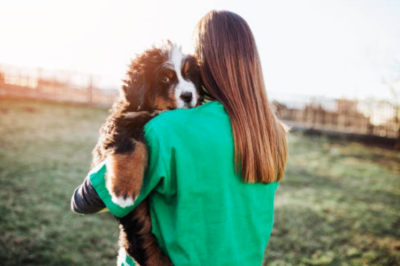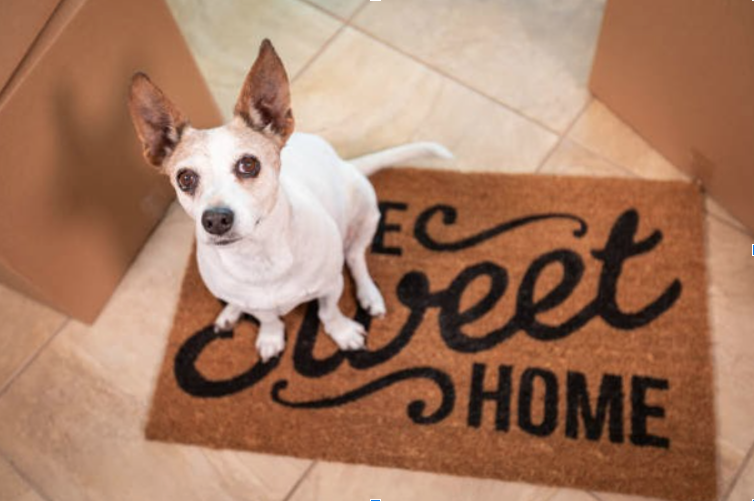Woman Faced Backlash for Rehoming Her Dog—Until the Real Story Came Out
What happens when you need to rehome a dog? What kind of response will you get from other people? I recently made a video about a woman putting her dog up for adoption. At first, she experiences a lot of judgement from the people around her, but there’s more to the story than meets the eye. (Watch video Above)
The dog shows all the signs of being nervous, fearful, and afraid, which makes the person adopting the dog assume that the woman has been hurting it.
As it turns out, rather than being a bad dog owner herself, the lady rehoming her dog is trying to keep it safe from her abusive partner. Although the woman who adopted the dog was at first furious with the dog’s old owner, she ends up feeling far more compassion once she discovers the truth.
While this video is fictional and featured a happy resolution, this isn’t always the case. Especially in the age of the internet, it’s easy for a situation to be misinterpreted, a rumor to then spread, and for the victim to then teamed up on by an entire community.
Ultimately, the issue is that we’re too quick to judge in tough situations like these. But why? What makes it so difficult for us to remain calm when it comes to rehoming animals?
Emotional Investment

It’s just like they say: dogs are man’s best friend. We don’t view them as just an animal, we view them as family members, almost like a child. And like people expect parents to treat their children well, we expect pet owners to take good care of their pets.
Pamela Morris, a former animal rescuer, summed it up perfectly: “Many pet owners, including myself, consider pets part of the family like a child. Especially us in rescue [who] see the thousands of pets in shelters because the owners consider them disposable.”
Many individuals naturally tend to assume the worst. This might be because they may not have struggled with the need to rehome an animal, and as such don’t see any reason as to why it would be necessary. They may then find it difficult to extend compassion, even when appropriate to do so.
What to Do

Simply put: just be kind!
Chances are, the person who rehomed their pet feels the same about the situation as you. They may be hurting, bitter, and fighting an invisible battle of their own. The last thing they need in this situation is someone to accuse them of being cruel and abusive towards their animal companion.
How To Responsibly Rehome Your Dog

In a perfect world, dogs and their families would be a perfect fit from the time the dog is brought home as a puppy. But in reality, not every dog is a perfect fit for their first home. Sometimes the best thing to do for everyone is to find a new home for the dog.
If you need to rehome your dog and don’t know where to start, here are some ways you can responsibly rehome your dog.
Why Rehome A Dog?
When people rehome dogs, it’s usually because of a mismatch between their home and the dog’s needs. You might have to move to a place that doesn’t suit your dog’s lifestyle. Your dog’s behavior or energy levels might not match what you are comfortable with. A new medical condition might mean that you can’t provide the kind of care your dog needs. What all of these situations boil down to is that the dog can’t thrive in the home environment, and it’s not fair to anybody, humans included, to keep them there.
It can be overwhelming to find the right rescue or otherwise responsibly rehome your pet. You’ll have a lot of feelings of guilt— but don’t think of rehoming like you’re throwing your pet away. If you truly need to rehome your pet, and you do it responsibly and find them just the kind of home they need, it’s really an act of love and kindness.
Start With Friends And Family
If you have to give up your dog because you’re moving or experiencing some other lifestyle change, check with your friends and family to see if any of them would be a good fit for your dog. If your dog is able to live with somebody they’ve already met, the transition will be easier for them. However, if you’re in a place where you’ll see the dog regularly, this might not be ideal as it can be emotionally confusing for both of you.
Find A Breed Or Group-Specific Rescue
Breed-specific rescues and group-specific rescues are usually a really good way to find your dog a new home. Many breed-specific rescues will help find homes for mixes with their focus breed, so even if you have a mixed breed they might be able to help! A group-specific rescue usually focuses on a specific type of dog, like senior dogs or large dogs. These groups have a network of foster homes and often have a list of vetted people waiting to adopt. These groups ask their potential adopters for a lot of information and may even do home visits, ensuring that the dogs they place are well-cared-for and loved.
Look For Local Fosters
Depending on where you live, you might have better options than a county or municipal-run shelter. Search for dog rescues in your area and see what comes up. Go through the results and look for a foster-based rescue.
A foster-based rescue keeps your dog in a home environment. Instead of being kept in a kennel, your dog is exposed to the routines, sounds, and smells of daily life. This means that any behavioral issues are likely to be noticed quickly and worked on, and it also means that the foster caretaker gets to know your dog.
When it’s time for your dog to find a permanent new home, they can tell the potential adopters exactly what the dog’s needs and preferences are. Foster-based rescues also do a lot of background research into potential adopters, which means that your dog will have the best chance of ending up in their ideal home.
Ask Your Vet
Your pet’s veterinarian is a great person to talk to when you’re considering rehoming your dog. Not only do they know your pet well, but they may also know other families who want to adopt a new pet. You might also be able to post flyers in their office to help find your pet a new home. This is a safe place to post an open call for a new home; it means that the people looking at your pet’s information are already people who care enough about their pets to be taking them to the vet.
Use A Matching Service

If you want to cast a broader net for your dog’s new home, there are reputable places online that can help. Rehome is an example of one of these. It provides a suite of tools that can help you screen potential new homes. You can upload your pet’s vital information and communicate with potential adopters, and the service even offers various adoption agreements to make sure that your pet is safe if the adoption doesn’t work out.
Mistakes To Avoid
No matter why you’re rehoming your dog, you have a responsibility to make sure that they end up in a great situation. In addition to keeping your dog out of the shelter system, you need to remember that not all resources are equally good.
One of the worst options for rehoming your dog is Craigslist. When you put your dog up on Craigslist, especially if you put them up for free, you’re inviting trouble. That’s because, on a website like Craigslist, it’s nearly impossible to do a thorough background check. Worse yet, there have been numerous cases of animal abusers using Craigslist to get animals to harm. The same goes for Facebook Marketplace and any other kind of classified ad site. While these sites might help you find a home for your dog quickly, you can’t guarantee that the home is good.
You should also never say that your pet is “free to a good home.” Instead, charge a rehoming fee, or require a donation to a shelter or rescue, if you’re rehoming your pet without the help of a rescue. This isn’t because you’re “selling” your pet. A small fee can help keep your pet in a safe home. Think of it this way: if somebody can’t pay your rehoming fee of $50, how are they supposed to pay for continued vet care?
How Can I Keep My Dog?

- If you feel like you need to rehome your dog because you are relocating temporarily, you might be able to find a temporary foster. Talk to your local animal shelter or look online, because some rescues and agencies will help you out by providing a temporary foster home for your dog. For example, Dogs on Deployment helps out military service members by fostering their pets when they’re away from home. Family members and trusted friends can also be great short-term or even long-term fosters.
- If you feel like you have to rehome your dog due to behavior issues, a dog behaviorist might be able to help you. A dog behaviorist is a type of trainer who is an expert in understanding why dogs act and do things the way they do. Working with this kind of professional can help you learn how to modify the dog’s behavior.
- If finances are the reason you’re looking to rehome your dog, reach out to your local animal shelter. Many shelters have programs to help keep people and their pets together during times of temporary hardship. This can include access to a pet food bank, reduced-cost veterinary care, and even short-term fostering.
It’s never fun to think about having to find your dog a new home. But if you know about these resources ahead of time, you might be able to prevent a rehoming situation! If you do have to rehome your dog, both you and your dog deserve the best possible outcome. If you use these resources, your dog is more likely to end up in a home that suits them— whether that’s your home or somebody else’s!



